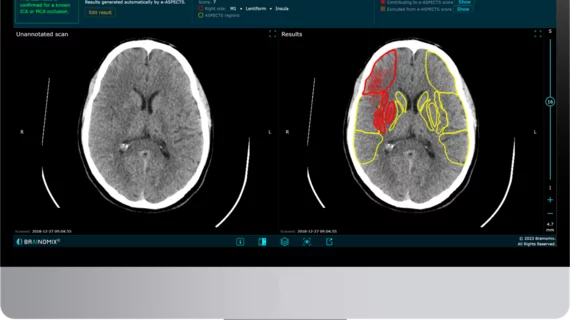Explainable stroke AI cleared for US sales
The FDA has OK’d an explainable AI platform for quickly diagnosing stroke on unenhanced CT scans.
Brainomix of Oxford, England, announced the clearance of its 360 e-Aspects tool March 21, noting it’s now in use across more than 30 countries.
The company says the product, named for the Alberta Stroke Program Early CT Score system, uses AI to automatically generate an Aspects score. The score displays on a heatmap laid over the imaging to help physicians visualize the nature and extent of ischemic changes.
Brainomix cites recent studies showing the software reduced diagnostic turnaround times by more than an hour in research settings.
The company says the result was the tripling of stroke patients who achieved functional independence and a 50%+ bounce in rates of effective thrombolysis and thrombectomy.
Brainomix CEO and co-founder Michalis Papadakis, PhD, says the ability to reliably diagnose stroke quickly and without contrast “carries particular clinical value for primary stroke centers, where there may not be around-the-clock specialist expertise but where most stroke patients are first admitted.”
He adds that the technology supports physicians “who are making time-sensitive, critical decisions around transfer and treatment, strengthening networks and facilitating an improved stroke service.”
Brainomix has a field team at the ready in the U.S. to familiarize stroke-center clinicians with the newly approved platform as well as supply ongoing support.
Earlier this year, the company announced a strategic partnership with Blackford, which will distribute the software across its network.
Brainomix notes the Aspects scoring system was created by company co-founder Alastair Buchan, MD, a neurologist and professor of stroke medicine at the University of Oxford.

